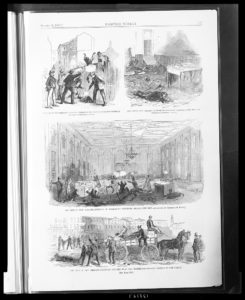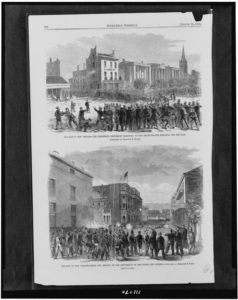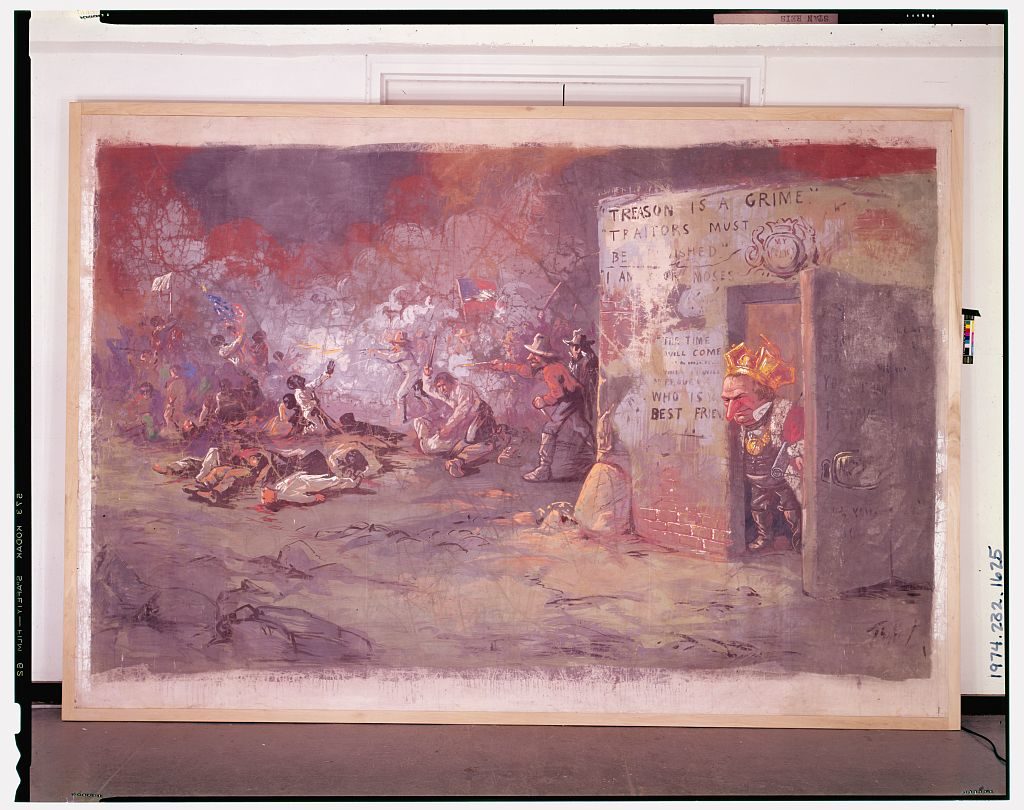On July 30, 1866 a riot broke out in New Orleans. Louisiana Governor James Madison Wells had called for a convention to “enfranchise blacks, prohibit ‘rebels’ from voting, and establish a new state government.” Opponents, including members of the city police, attacked the gathering. At least 37 people were killed and over 100 injured in what General Philip Sheridan called a massacre. According to Hannibal Hamlin’s son, a Civil War veteran: “the wholesale slaughter and the little regard paid to human life I witnessed her” were worse than anything he had seen in battle.[1]
Here is an 1896 summary from The Struggle between President Johnson and Congress over Reconstruction by Charles Ernest Chadsey:
The laws discriminating against the colored man, and the numerous instances of cruelty which had been reported to the North, were an important factor in creating and sustaining the common feeling of hostility to the administration. But the New Orleans riots, occurring on July 30, did more to rouse the people of the North, and convince them that stern measures were necessary, than all that had preceded. The massacre stood out vividly against the background of “black laws,” and furnished an argument of the most effective kind to be used in the campaign.
2. The riots were of a peculiarly exasperating character. The constitutional convention of 1864, summoned by the proclamation of Major General Banks, had passed resolutions giving the president of the convention power “to reconvoke the convention for any cause.” A majority of the members came to the conclusion, in the spring of 1866, that the State constitution should be amended, to place it in harmony with the congressional policy. They determined to have the convention reconvoked for this purpose. The president, Judge E. H. Durell, declined to take advantage of his prerogative, but the delegates, not to be thwarted in this way, proceeded to elect a president pro tem. who was willing to issue the desired proclamation. The governor of the State, J. M. Wells, concurred in this rather questionable procedure, and issued a proclamation for an election to fill existing vacancies.
It being well understood that negro suffrage was one of the ultimate objects desired by the supporters of the proposed constitutional convention, active hostility to the movement rapidly developed. The proclamation of the president pro tem. called for the assembling of the delegates on July 30; and though the only object of this meeting was to determine officially the existing vacancies to be filled in the fall elections, the enemies to the enfranchisement of the freedmen determined to crush the movement in its incipient stage. It is an easy matter to stir up the passions and prejudices of the people, and the indiscreet speeches of certain of the delegates only added to the popular excitement. A negro procession organized in honor of the convention was attacked by a mob in front of Mechanics’ Hall, where the convention was in session. The attack was soon extended to the hall itself, the police of the city joining hands with the assailants. When the riot was over nearly two hundred persons were found to have been killed or wounded, the greatest sufferers being the negroes, who were shot down in front of the hall without mercy.
The flagrancy of the act, the connivance of the city authorities, and the fact that, while legal steps were taken against the delegates and innocent spectators, the actual murderers were in no way molested, furnished to the people of the incensed North ample proof of the inability of the South to maintain local government, and of the advisability of refusing to restore these States to their former position in the Union. New Orleans was taken as a fair example of what might happen at any place in the South. There was no satisfactory justification for these acts of violence, and there was little inclination in the North to consider the legal technicalities involved in the attempt to amend the constitution of Louisiana. They simply took cognizance of the fact that about fifty loyal citizens had been murdered in cold blood, with the city authorities silently acquiescing. In the face of such a fact, the solicitude of the President to preserve the “inherent rights of the States” did not appeal to the masses, and Johnson was forced to begin his campaign badly handicapped.
But, in addition to the blow given to the theory of the administration, Johnson was forced to labor against a certain amount of personal censure, brought about by his supposed attitude before the riots and his known attitude after them. It was freely charged that he was in full sympathy with the determination of the Mayor of New Orleans, and the Lieutenant-Governor and Attorney-General of Louisiana, to prevent the convention from accomplishing its plans. In support of the charge, his answer to the inquiry as to whether the military power would interfere with the attempt to arrest the members of the convention upon criminal process was cited. His reply was as follows: “The military will be expected to sustain, and not to obstruct or interfere with the proceedings of the court.” While this may have indicated too great confidence in the civil authorities of Louisiana, it certainly did not imply any connivance in or sympathy with the summary proceeding of July 30. Possibly the well-known opposition of Johnson to negro suffrage may have stimulated the rioters to bolder defiance of Northern sentiment, but censure of him can extend no farther. But, in his political canvass in the fall, while endeavoring in every way to discredit the 39th Congress in the eyes of the people, he committed a grave error by an indirect defense of the rioters, attacking the members of the convention as traitors who incited the negro population to rioting, and throwing the responsibility of the whole affair back upon Congress as having originated and fostered the plan to force negro suffrage upon Louisiana. …
- [1]Foner, Eric. Reconstruction: America’s Unfinished Revolution, 1863-1877. New York: HarperPerennial, 2014. Updated Edition. Print. page 263.↩



